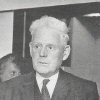Hazell, Bert(ie), MBE, CBE
1907-2009
Bert Hazell was born in Attleborough, Norfolk on 18 April 1907. His father, a horseman on a farm, earned fifteen shillings for a seven-day week and was pleased to join the army in 1915 in order to improve his pay. At the end of the war, the family moved to Silfield near Wymondham where his father was employed as head horseman.
Bert saw the degradation of the farm labourers who were valued in summer, but then largely cast aside in winter and forced to work breaking stones for road repairs in order to keep themselves from the workhouse.
The family attended the Primitive Methodist chapel in Silfield. In retrospect Bert valued the influence of the Christian Endeavour group which had given him the confidence to speak in public and prepare and communicate material to present to others.
In 1921 he began work on a farm. His earnings were pitifully meagre following the slump in wages in the 1920s. Over two years his pay was halved to 7/6d a week whilst his father's wages dropped to just 25 shillings each week. When in 1923 the farmers threatened to cut wages still further to 18 shillings for men with 4/6d for boys, the great strike of Norfolk farm workers began. Hazell was much involved and came into contact with George Edwards and Edwin Gooch.
When the farm where he worked changed hands in 1933, the new owner insisted that Bert should cease his political work or else leave the farm. He left. A very short time afterwards he was offered the job of Secretary-Agent in the East Norfolk constituency Labour Party. He was then just 26 years old.
In 1938 he became Organiser of the National Union of Agricultural and Allied Workers in Yorkshire. He was appointed to several union national committees as well as the Agricultural Wages Board on which he served for 35 years. He became President of the union in 1966 and served for twelve years. He led a delegation of union members to the Soviet Union during the Cold War. He was also a magistrate.
In 1964 he was the last-minute candidate for North Norfolk on the death of the sitting MP Edwin Gooch and was elected with a majority of 53 votes. He was re-elected in 1966, but was defeated in 1970. He was Vice-Chairman of the Parliamentary Agricultural Group and served on many committees.
In 1946 he was awarded an MBE for services to agriculture and in 1960 was awarded a CBE for services to industry. In 1984 he received an honorary degree from the University of York. He died on 11 January 2009.
Occupations
Entry written by: NV
Category: Person
Comment on this entry
